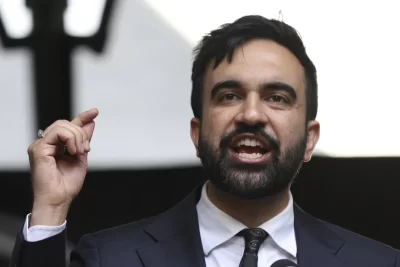
WASHINGTON — Hours clicking toward a midnight government shutdown deadline, the Senate was preparing to give final passage late Friday to a new plan that would temporarily fund federal operations and disaster aid, but drops President-elect Donald Trump’s demands for a debt limit increase into the new year.
House Speaker Mike Johnson had insisted Congress would “meet our obligations” and not allow federal operations to shutter ahead of the Christmas holiday season. But the day’s outcome was uncertain after Trump doubled down on his insistence that a debt ceiling increase be included in any deal — if not, he said in an early morning post, let the closures “start now.”
The House approved Johnson’s new bill overwhelmingly, 366-34, and the Senate was working late into the night toward votes.
“This is a good outcome for the country, ” Johnson said afterward, adding he had spoken with Trump and the president-elect “was certainly happy about this outcome, as well.”
It was the third attempt from Johnson, the beleaguered House speaker, to achieve one of the basic requirements of the federal government — keeping it open. And it raised stark questions about whether Johnson will be able to keep his job, in the face of angry GOP colleagues, and work alongside Trump and billionaire ally Elon Musk, who called the legislative plays, from afar.
President Joe Biden, who has played a less public role in the process throughout a turbulent week, was expected to quickly sign the measure into law.
Trump’s last-minute demand was almost an impossible ask, and Johnson had almost no choice but to work around his pressure for a debt ceiling increase. The speaker knew there wouldn’t be enough support within the GOP majority to pass any funding package, since many Republican deficit hawks prefer to slash federal government and certainly wouldn’t allow more debt.
Instead, the Republicans, who will have full control of the White House, House and Senate next year, with big plans for tax cuts and other priorities, are showing they must routinely rely on Democrats for the votes needed to keep up with the routine operations of governing.
“So is this a Republican bill or a Democrat bill?” scoffed Musk on social media ahead of the vote.
The drastically slimmed-down 118-page package would fund the government at current levels through March 14 and add $100 billion in disaster aid and $10 billion in agricultural assistance to farmers.
Gone is Trump’s demand to lift the debt ceiling, which GOP leaders told lawmakers would be debated as part of their tax and border packages in the new year. Republicans made a so-called handshake agreement to raise the debt limit at that time while also cutting $2.5 trillion in spending over 10 years.
It’s essentially the same deal that flopped the night before in a spectacular setback — opposed by most Democrats and some of the most conservative Republicans — minus Trump’s debt ceiling demand.
But it’s far smaller than the original bipartisan accord Johnson struck with Democratic and Republican leaders — a 1,500-page bill that Trump and Musk rejected, forcing him to start over. It was stuffed with a long list of other bills — including much-derided pay raises for lawmakers — but also other measures with broad bipartisan support that now have a tougher path to becoming law.
House Democrats were cool to the latest effort after Johnson reneged on the hard-fought bipartisan compromise.
Rep. Rosa DeLauro, the top Democrat on the Appropriations Committee, said it looked like Musk, the wealthiest man in the world, was calling the shots for Trump and Republicans.
“Who is in charge?” she asked during the debate.
Still, the Democrats put up more votes than Republicans for the bill’s passage. Almost three dozen conservative Republicans voted against it.
“The House Democrats have successfully stopped extreme MAGA Republicans from shutting down the government, crashing the economy and hurting working class Americans all across the nation,” House Democratic Leader Hakeem Jeffries said after the vote.
Trump, who has not yet been sworn into office, is showing the power but also the limits of his sway with Congress, as he intervenes and orchestrates affairs from Mar-a-Lago alongside Musk, who is heading up the incoming administration’s new Department of Government Efficiency.
The incoming Trump administration vows to slash the federal budget and fire thousands of employees and is counting on Republicans for a big tax package. And Trump’s not fearful of shutdowns the way lawmakers are, having sparked the longest government shutdown in history in his first term at the White House.
“If there is going to be a shutdown of government, let it begin now,” Trump posted early in the morning on social media.
More important for the president-elect was his demand for pushing the thorny debt ceiling debate off the table before he returns to the White House. The federal debt limit expires Jan. 1, and Trump doesn’t want the first months of his new administration saddled with tough negotiations in Congress to lift the nation’s borrowing capacity. Now Johnson will be on the hook to deliver.




